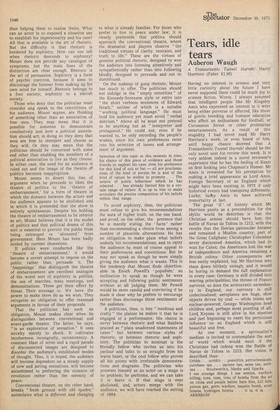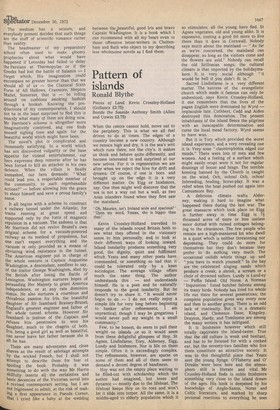Tears, idle tears
Auberon Waugh
A Transatlantic Tunnel Hurrah! Harry Harrison (Faber £1.90) Having no interest in science and very little curiosity about the future I have never supposed there could be much joy in science fiction. Worse, I always assumed that intelligent people like Mr Kingsley Amis who expressed an interest in it were being either perverse or affected, like those of gentle breeding and humane education who affect an enthusiasm for football, or Coronation Street or other proletarian entertainments. As a result of this stupidity I had never read Mr Harry Harrison's work, or even heard of him, until happy chance decreed that A Transattantic Tunnel Hurrah! should be the only novel sent for review this week. It is very seldom indeed in a novel reviewer's experience that he has the feeling of Keats on first looking into Chapman's Homer. Mr Amis is rewarded for his perception by making a brief appearance as Lord Amis, Foreign Secretary of an England which might have been existing in 1973 if only historical events had transpired differently. Lucky, lucky Amis to have achieved immortality at last.
The great ' if ' of history which Mr Harrison posits as a precondition for the idyllic world he describes is that the Christian armies should have lost the battle of Navas de Tolosa in 1212, with the results that the Iberian peninsular became and remained a Muslim country, part of the Great Caliphate; Christopher Columbus never discovered America, which had to wait for Cabot; the Americans lost the war of independence and America remained a British colony. Other consequences are less easily explained, but Mr Harrison sets them down blithely enough, and it would be boring to demand the full explanation in every case: Germany is still divided into warring principalities; the throne of France survives, so does the aristocratic ascendancy in England; our currency is still undecimalised; aeroplanes are huge, slow objects driven by coal — while trains are nuclear-powered; George Washington bred children and, perhaps most puzzling of all, Lord Keynes is still alive in his nineties and just beginning to exert his pernicious influence on an England which is still beautiful and free.
At one moment, a spiritualist's medium is invited to contemplate the sort of world which would exist if the Christians had indeed won the Battle of Navas de Tolosa in 1212. Her vision is described thus: lirhhh . . . urrhhh ...penicillin, petrochemicals, purchase tax . . . income tax, sales tax, anthrax . . . Woolworth's, Marks and Sparks . . I see strange things . I see armies, warfare, killing, tons, tons, tons of bombs from the air on cities and people below hate him, kill him, poison gas, germ warfare, napalm bomb, atom bombs, hydrogen bombs . . . it is, it is . . ARRRRGH!
The medium has a seizure, and everybody present decides that such things are the stuff of scientific romance rather than reality.
The headmaster of my preparatory school often used to make gloomy prophecies about what would have happened if Leonidas had failed to delay the Persians at Thermopylae or if the Greeks had lost the battle of Salamis — I forget which. His imagination could encompass no greater horror than that we should all of us — the Classical Sixth Form of All Hallows, Cranmore, Shepton Mallet, Somerset, that is — be lolling around on cushions smoking hashish through a hookah. Knowing the predilections of my contemporaries, I should not be in the least surprised to find this is exactly what many of them are doing now. Mr Harrison's schema is altogether more imaginatively contrived, and one finds oneself sighing time and again for the beautiful world which might have been.
The novel's plot is complicated and , immensely satisfying. In a world which has not discovered vulgarity or the base appetite for violent entertainment, our hero expresses deep remorse after he has been forced to kill an attacker in his own defence. When the villain is finally unmasked, our hero demands: "What could lead you, a respectable member of the community, to such reprehensible actions?" — before allowing him the grace to shoot himself and save a proud family's name.
It all begins with a scheme to construct a railway tunnel under the Atlantic, for trains running at great speed and supported only by the force of magnetic repulsion in a vacuum. The sadness is that Mr Harrison did not revive Brunel's own• original scheme for a vacuum-powered railway as its method of propulsion, but one can't expect everything and the vacuum is only provided as a means of Obviating wind resistance in the tunnel. The American engineer put in charge of the whole venture is Captain Augustine Washington, a descendant, needless to say, of the traitor George Washington, shot by the British after losing the Battle of Lexington. Washington nurtures hopes of Persuading Her Majesty to grant America independence, or at any rate dominion status. He also nurtures a courteous and Chivalrous passion for Iris, the beautiful daughter of Sir Isambard Brassey-Brunel, England's greatest engineer and father of the whole tunnel scheme. However Sir Isambard is jealous of the Captain and refuses him permission to woo his
daughter, much to the chagrin of both. Iris, being a good girl as well as beautiful, Can never leave her father because she is all he has.
There are many adventures and close Shaves as the result of sabotage attempts by the wicked French, but I shall not attempt to describe them for fear of sPoiling the book. Probably it was something to do with the way Mr Harris Skilfully inserts all the certainties and basic decencies of the Victorian novel into
a revised contemporary setting, but I am not frightened to admit, at the risk of making a first appearance in Pseuds Corner, that I cried like a baby at the wedding
between the peautiful, good Iris and brave Captain Washington. It is a book which I can recommend with all my 'heart even to those offensive letter-writers in Cheltenham and Bath who object to my describing less wholesome novels as I find them.



































 Previous page
Previous page